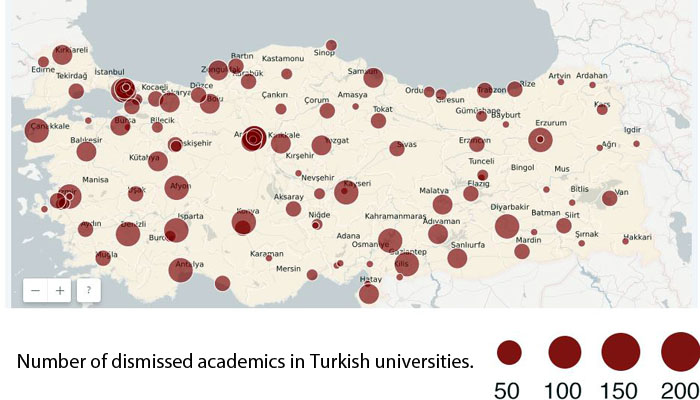A total of 23,427 academics have been affected by a state of emergency (OHAL) that was declared following a failed coup attempt on July 15, 2016, BBC Turkish reported on Tuesday.
According to the report, at least 23,427 academics either lost their jobs at universities when their contracts were terminated or were dismissed from their positions, or the universities where they worked were closed down by the government after Sept. 1, 2016.
Critics say the collective dismissal of academics and collective verdicts without specifying individual crimes violates the principle of “the individuality of crime and punishment in law.”
Emergency rule was declared for three months on July 21, 2016 and became effective with a government decree issued on July 23, 2016. With the first decree, No. 667, 15 universities were closed down on the grounds that they were linked to the faith-based Gülen movement, accused by the Turkish government of leading the failed coup, a claim the movement denies.
There is no information about the number of administrative staff members working at these universities who were affected, but 2,808 academics were left unemployed and 65,000 students had to seek new universities according to figures from Turkey’s Council of Higher Education (YÖK).
Six state decrees issued in one year caused the dismissal of 5,247 academics from 117 universities.
BBC Turkish spoke to university rectors, who YÖK said were responsible for the dismissal of academics, to ascertain the reasons for the dismissal of the academics.
The rectors said they were working together with the relevant intelligence services while deciding on the dismissal of academics, but they did not explain what kind of information they received or what caused the dismissal of thousands of academics.
One of the rectors, İbrahim Uslan from Gazi University in Ankara, said links to the Gülen movement was one of the criteria “assigned by the government” to dismiss academics.
The rectors also added that academics who signed a peace declaration accusing Turkish government of carrying out heavy-handed operations in Turkey’s southeastern region were added to the list of dismissals. A total of 372 of them were fired either by state decree or termination of their contracts.
Another state decree in September targeted 15,000 research assistants for their alleged links to the Gülen movement. They were part of an Assistant Professor Training Program (ÖYP) that was launched in 2010 to meet the need for academics in Turkey.
